| dc.contributor.author | Navas Gotopo, Soratna Veronica | |
| dc.contributor.author | Flores Perozo, Ines Del Carmen | |
| dc.contributor.author | Ramirez Saenz Soto, Carmen | |
| dc.contributor.author | Campos Rosendo, Nelson Jesús | |
| dc.contributor.author | Raez Martínez, Haymin Teresa | |
| dc.contributor.author | Arana Meza, Luis | |
| dc.contributor.author | Saldaña Narro, Julio Brayan | |
| dc.date.accessioned | 2024-04-01T22:02:15Z | |
| dc.date.available | 2024-04-01T22:02:15Z | |
| dc.date.issued | 2023 | |
| dc.identifier.uri | https://hdl.handle.net/20.500.13067/3072 | |
| dc.description.abstract | The purpose of this research was to determine the impact of pedagogical support as a strategy to strengthen management in the classroom of a public school in Peru, located in the positivist paradigm, under the modality of descriptive field work and It is inserted in the research line of the Autonomous University of Peru, called: Person, Society, Company and State. It was based on Maslow's Hierarchy of Needs Theory (2000). The population was made up of the Directors and Secondary Education Teachers of a public school in Lima. The sample was made up of: one (1) Director, nine (9) Coordinators and Twentyseven (27) teachers, making a total of (37) Teachers to be surveyed. The technique used was the survey and observation, as an instrument a questionnaire was applied, structured with fourteen (14) questions with a Likert scale, with alternatives (S) Always, (CS) Almost Always, (AV) Sometimes, (CN) Almost Never, (N) Never, in order to provide selection options to obtain the answers clearly. Subsequently, the evaluation of a group of experts from UNEFM and UPEL was requested, to be subjected to the technical validity of the instrument, then Cronbach's Alpha reliability was applied, the result of which was 0.93 Very High. Next, the data analysis was carried out using tables and graphs, supported by a detailed explanation of the results obtained. The results reflected the lack of a Director with a pedagogical accompanying function with little knowledge for performance, who does not promote motivation and transformation in the classroom in teachers and who does not use resources that support his participation as a companion, thus creating weakness in the monitoring process in teachers. | es_PE |
| dc.format | application/pdf | es_PE |
| dc.language.iso | spa | es_PE |
| dc.publisher | Proceedings of the LACCEI international Multi-conference for Engineering, Education and Technology | es_PE |
| dc.rights | info:eu-repo/semantics/openAccess | es_PE |
| dc.rights.uri | https://creativecommons.org/licenses/by-nc-nd/4.0/ | es_PE |
| dc.subject | Pedagogical support | es_PE |
| dc.subject | Classroom management | es_PE |
| dc.subject | Strategy | es_PE |
| dc.title | PEDAGOGICAL SUPPORT IN CLASSROOM MANAGEMENT: A STRATEGY TO STRENGTHEN THE EDUCATIONAL PROCESS | es_PE |
| dc.type | info:eu-repo/semantics/article | es_PE |
| dc.identifier.journal | Proceedings of the LACCEI international Multi-conference for Engineering, Education and Technology | es_PE |
| dc.subject.ocde | https://purl.org/pe-repo/ocde/ford#5.01.00 | es_PE |
| dc.source.beginpage | 1 | es_PE |
| dc.source.endpage | 6 | es_PE |


